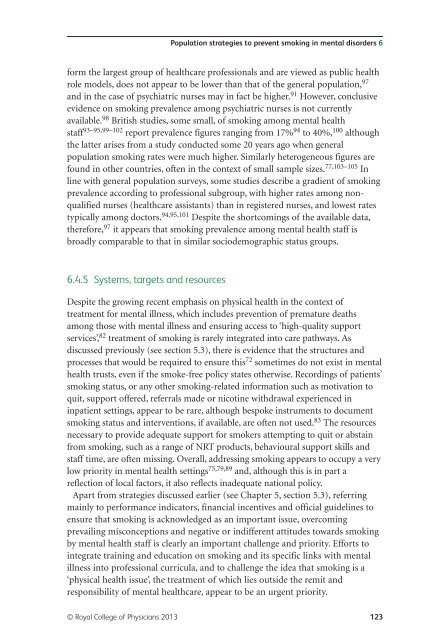Smoking and mental health - NCSCT
Smoking and mental health - NCSCT
Smoking and mental health - NCSCT
You also want an ePaper? Increase the reach of your titles
YUMPU automatically turns print PDFs into web optimized ePapers that Google loves.
Population strategies to prevent smoking in <strong>mental</strong> disorders 6<br />
form the largest group of <strong>health</strong>care professionals <strong>and</strong> are viewed as public <strong>health</strong><br />
role models, does not appear to be lower than that of the general population, 97<br />
<strong>and</strong> in the case of psychiatric nurses may in fact be higher. 91 However, conclusive<br />
evidence on smoking prevalence among psychiatric nurses is not currently<br />
available. 98 British studies, some small, of smoking among <strong>mental</strong> <strong>health</strong><br />
staff 93–95,99–102 report prevalence figures ranging from 17% 94 to 40%, 100 although<br />
the latter arises from a study conducted some 20 years ago when general<br />
population smoking rates were much higher. Similarly heterogeneous figures are<br />
found in other countries, often in the context of small sample sizes. 77,103–105 In<br />
line with general population surveys, some studies describe a gradient of smoking<br />
prevalence according to professional subgroup, with higher rates among nonqualified<br />
nurses (<strong>health</strong>care assistants) than in registered nurses, <strong>and</strong> lowest rates<br />
typically among doctors. 94,95,101 Despite the shortcomings of the available data,<br />
therefore, 97 it appears that smoking prevalence among <strong>mental</strong> <strong>health</strong> staff is<br />
broadly comparable to that in similar sociodemographic status groups.<br />
6.4.5 Systems, targets <strong>and</strong> resources<br />
Despite the growing recent emphasis on physical <strong>health</strong> in the context of<br />
treatment for <strong>mental</strong> illness, which includes prevention of premature deaths<br />
among those with <strong>mental</strong> illness <strong>and</strong> ensuring access to ‘high-quality support<br />
services’, 82 treatment of smoking is rarely integrated into care pathways. As<br />
discussed previously (see section 5.3), there is evidence that the structures <strong>and</strong><br />
processes that would be required to ensure this 72 sometimes do not exist in <strong>mental</strong><br />
<strong>health</strong> trusts, even if the smoke-free policy states otherwise. Recordings of patients’<br />
smoking status, or any other smoking-related information such as motivation to<br />
quit, support offered, referrals made or nicotine withdrawal experienced in<br />
inpatient settings, appear to be rare, although bespoke instruments to document<br />
smoking status <strong>and</strong> interventions, if available, are often not used. 83 The resources<br />
necessary to provide adequate support for smokers attempting to quit or abstain<br />
from smoking, such as a range of NRT products, behavioural support skills <strong>and</strong><br />
staff time, are often missing. Overall, addressing smoking appears to occupy a very<br />
low priority in <strong>mental</strong> <strong>health</strong> settings 75,79,89 <strong>and</strong>, although this is in part a<br />
reflection of local factors, it also reflects inadequate national policy.<br />
Apart from strategies discussed earlier (see Chapter 5, section 5.3), referring<br />
mainly to performance indicators, financial incentives <strong>and</strong> official guidelines to<br />
ensure that smoking is acknowledged as an important issue, overcoming<br />
prevailing misconceptions <strong>and</strong> negative or indifferent attitudes towards smoking<br />
by <strong>mental</strong> <strong>health</strong> staff is clearly an important challenge <strong>and</strong> priority. Efforts to<br />
integrate training <strong>and</strong> education on smoking <strong>and</strong> its specific links with <strong>mental</strong><br />
illness into professional curricula, <strong>and</strong> to challenge the idea that smoking is a<br />
‘physical <strong>health</strong> issue’, the treatment of which lies outside the remit <strong>and</strong><br />
responsibility of <strong>mental</strong> <strong>health</strong>care, appear to be an urgent priority.<br />
© Royal College of Physicians 2013 123














